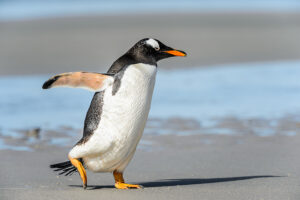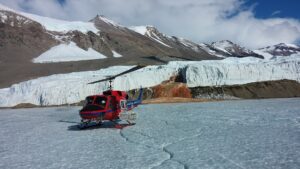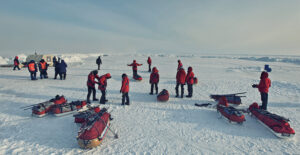Crossings
Gareth Andrews and Richard Stephenson
“The mythical good conditions in the last degree are still eluding us,” Andrews wrote as they approached the Pole. Though there was no reprieve from the soft, sticky snow and sastrugi, the pair saw out the final 185km averaging roughly 27km per day.
After 66 days and 1,400km, Andrews and Stephenson arrived at the South Pole on January 18. Originally the duo had planned to cover 2,023km in the same amount of time, showing how hard they’ve found the going from Berkner Island. Last week, they announced that they would be unable to complete the final stage of their journey from the South Pole to the Ross Ice Shelf.

Andrews and Stephenson at the Pole. Photo: Gareth Andrews and Richard Stephenson
“No rest days, late starts or early finishes, we gave it everything every day,” they wrote in their final update from the Pole.
Preet Chandi
Chandi’s decision to push on from the Pole, despite having no chance of reaching the Ross Ice Shelf to complete her crossing, now makes more sense. Today she announced that she had “broken the world record for the longest, solo, unsupported, unassisted polar expedition by a woman”. Though no distance was announced, her tracker puts her at 1,400km, just a few kilometers further than Anja Blacha’s 1,381km journey from Berkner Island to the Pole in 2019-2020.
The Polar Expedition Classification Scheme (PECS) does not recognize the term “unassisted,” but Chandi’s unsupported claim will require confirmation that she hasn’t used the South Pole Overland Traverse road, a graded, marked road from the South Pole toward the coast. Her tracker appears to show her near it.
“I’m assuming she didn’t use the SPOT road, as she knows it would negate her unsupported claim,” says polar guide and PECS founding member Eric Philips. “The SPOT route and Reedy route are very close to each other for the first couple of days but start to diverge.”
Note that Chandi’s Hercules Inlet to the Pole (the usual route) is shorter than Berkner Island to the Pole (1,130km vs 1,381km), hence Chandi’s need to continue on a little, though she had no time to complete her original goal to the Ross Ice Shelf.
The record is an obscure one: Blacha had not set out to break a women’s distance record and was perhaps even unaware of it until after her expedition. In an interview with us in 2019, she explained why she picked a Berkner Island start: “I want to start where common sense tells me that the Antarctic coastline begins, rather than at a point based on a geographic definition with limited practical value.” In other words, she didn’t pick a starting point with a view to breaking a record.
If confirmed, Chandi’s new record comes in unusual circumstances. She will have set it during an incomplete expedition. Presumably, ALE will also have to evacuate her in the next few days when she runs out of supplies and time. Fourteen hundred kilometers through Antarctica is a solid distance, though.
Six-person Australian team
This team also battled sticky snow over the last few days, describing it as “like dragging our pulks through wet cement.”

The four remaining members of the Australian team at the Pole. Photo: The Spirit Lives
Hercules Inlet to the South Pole
Mikko Vermas and Tero Teelahti also made the Pole on January 17, finishing in 51 days from Hercules Inlet. Continuing the positive energy of their final few updates, they reported great skiing weather on the Antarctic plateau, with sun and no wind. According to their website, Vermas and Teelahti have now completed unsupported expeditions to both Poles, while Vermas has also climbed Everest (with O2).
On January 14, Ben Weber completed a grueling final day to the Pole. His neck had been bothering him again, but he covered 32km in over 16 hours and collapsed, exhausted into camp. He completed his journey in 59 days.
A day later, Hedvig Hjertaker arrived too, finishing in 49 days. As with the other Norwegians, AK Gluck-Teigland and Kjartan Bergsvag, it seems that the “skiers” among this year’s Hercules Inlet expeditions managed a much faster pace and were less bothered by Antarctica’s conditions.
A new route to the Pole
Eric Philips recently completed a new route to the South Pole, from the Filchner Ice Shelf via Support Force Glacier. Philips was guiding Austrians Alexandra Guryeva, Jens Neumann, and Stefan Prucker.
Philips believes that the 868km route, which they completed in 50 days, might pave the way for the first full ski crossing of Antarctica.
“With the route virtually crevasse-free, minimal sastrugi, and wind primarily from the east or northeast, I believe the Support Force Glacier is set to supersede the classic but cumbersome route from Berkner Island and over the Dufek Massif,” Philips wrote.
You can check out their route here.

Eric Philips, Alexandra Guryeva, Jens Neumann, and Stefan Prucker. Photo: Eric Philips
Running Mount Vinson
Another rather obscure record was set this season when Brazilian ultrarunner Fernanda Maciel ran up (and then down) Mount Vinson. She set a fastest-known time of 9 hours and 41 minutes.






